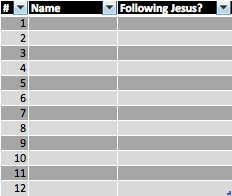How Do We Identify a Mission?
In a comment from the post on “How to Multiply a Missional Community“, I was asked:
Would you consider a post on identifying the mission and the process of clarification, especially in the context of starting a new MC? If you have a workplace focus, what about your neighborhood? If you focus on your neighborhood, what about your network scattered all over the city? How do you focus the mission without ignoring some people?
That’s an excellent question, and I wanted to take some time to answer it.
The Mission is to Make Disciples
I think the first critical piece in answering this question is understanding the mission of the church is to make disciples of Jesus. Mission is primarily about people, not projects! We do mission through the demonstration and declaration of the gospel to people with real names, real lives, and real stories.
A Pocket of People
People live individual lives, and as the question I received implies, it can be really hard to nail down who you are going to invest in. A pocket of people is probably best defined by a network of relationships that people have in common (a workplace, a particular affinity like CrossFit, etc.) or a neighborhood (a shared geographic space where life tends to happen).
For me, I live in the Wells Branch neighborhood, and it has a tight knit sense of community, and our lives overlap a lot with many others in our neighborhood. That doesn’t mean, though, that I am absolved of pursuing people in other spheres. Like the Good Samaritan in Luke 10, anyone whom I happen to meet and I have the resources to serve is my neighbor!
Proactive vs. Reactive Mission
For me, it’s helpful to think about mission in this way – proactively, my missional community will intentionally pursue relationships in our neighborhood, but we will reactively pursue mission as the Spirit seems to lead and provide opportunities. Rather than solely focusing on one neighborhood or network, we are intentionally focusing much of our proactive time together there, but reacting to different people and needs that may arise.
That means we’re going to do the practices of missional community so that folks from Wells Branch will be able to participate, but reactively, we’ll go out of our way to love and serve anyone who has need in our city.
Identifying Names and Overlap
As you start a new missional community, rather than simply arbitrarily choosing a mission, I would recommend spending a lot of time focusing on names of people that your core team already knows. I often use an exercise illustrated by the chart below with an entire community. Have everyone:
- Create a chart with two columns and ten rows
- In the first column, write out the twelve people you spend the most time with
- In the second column, write whether they are following Jesus or not

Those who are following Jesus are your community, and those who aren’t following Jesus are your mission. If a newly forming community has each participant do this exercise, look for overlaps in those lists. Your mission as a community will be whatever the common thread is that holds those relationships together.
If there isn’t, think of places and ways that you can begin to integrate your lists together over time. How can you naturally involve those believers in your group with folks who aren’t yet following Jesus on a regular basis?
Teams of Missionaries vs. Missionary Teams
Lastly, most missional communities will begin more along the lines of a Team of Missionaries, and transition to a Missionary Team over time. Generally speaking, because we live in such an individualistic culture, true pockets of people can be hard to come by.
Start with people who live, work, or play in generally the same place and have a passion to make disciples, cultivate a loving community, and start looking for ways to overlap relationships that you already have. Also, you can start with folks around you who have an interest in Jesus, but aren’t yet followers!
Intention, Not Perfection
Lastly, I’ll say this – missional community is about practices helping serve the mission to make disciples, not perfection in the model. Many people have been loved and served well by lots of other forms of church, and while I think missional community is a particularly effective strategy, it’s not absolute. Pursue a heart that is captivated by God and His word, and is seeking to obey what He commands, and over time, community and mission will tend to come around.
Leave a Reply